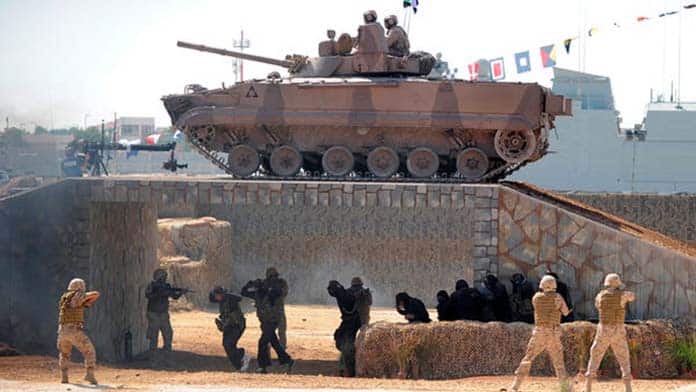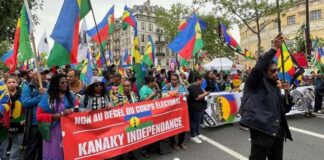Australian manufacturers are profiting from selling military technology and deadly weapons to brutal regimes around the world, including Saudi Arabia, the UAE and up to 18 African countries.
Buyers include Sudan, where the military has been using its firepower to try to quell a revolutionary upheaval; Burkina Faso, where the military is accused of executing hundreds of prisoners; Zimbabwe, where the government is suspected of abducting and torturing political opponents; and Eritrea, a country run for decades by a dictatorship. It also includes countries accused of using child soldiers.
SBS Dateline used a Freedom of Information request covering 2015-2020 to reveal the scale of the trade, reporting that: “Worldwide, defence officials approved the sale of an estimated $5 billion worth of military equipment in 2019-20—more than the typical yearly export value of Australian wine, wool or wheat.”
Melissa Parke, a former lawyer for the United Nations and ex-Labor MP, told Dateline: “Australia has increased arms exports, including to countries accused of war crimes, while decreasing transparency about those exports.”
Dateline reports that Australia markets itself to international customers using the Australian Defence Sales Catalogue, “which reads like a giant K-Mart pamphlet of military capability”.
Featured in the 2021 catalogue are armoured vehicles, mortar systems, automatic assault rifles and drones equipped to carry “lethal” payloads.
The Australian government’s Defence Export Strategy outlines how military sales will be scaled up. It lists the Middle East as a “priority market”, Dateline reports.
The weapons sales are part of Australia’s push to become a major weapons exporter. In January 2018, then Prime Minister Malcolm Turnbull announced that Australia was gearing up to become one of the world’s largest arms dealers, with plans to expand defence industry exports from $1.5 billion to $2.5 billion a year over the following decade, a target that’s already been exceeded.
Defence Minister at the time Christopher Pyne proclaimed that Australia aspired to be among the top-ten weapons exporters, a vision which Parke called “grotesque”.
Most Australian military exports consist, according to the government’s own definition, of “Category 1” equipment designed specifically for military use or equipment that is “inherently lethal”. That includes ammunition, missiles, guns and tanks.
Australia is also one of a group of countries that’s home to overseas weapon companies.
The Stockholm International Peace Research Institute reports that: “The United Kingdom, Australia, the USA, Canada and Germany host the largest numbers of these foreign entities. Outside the arms industry hubs of North America and Western Europe, the largest numbers of entities of foreign companies are hosted by Australia (38), Saudi Arabia (24), India (13), Singapore (11), the UAE (11) and Brazil (10).”
Arming Australia
Australia is also among the top ten arms importers worldwide. In recent weeks the government announced it would spend a further $3.5 billion on tanks, on top of the $100 billion or more to be spent on nuclear-powered submarines.
All of this is meant to bolster Australia’s arsenal in the context of rising imperialist tensions with China.
Australia’s wealth and geo-political power depends on maintaining its place within the world system of imperialism. While Morrison talks about “values”, economic and geopolitical imperatives shape Australia’s foreign policy and the arms trade plays a role in this.
Australia has had a history of making money from supporting despotic regimes.
For example, Australia provided military training and hardware to Indonesia between 1975 and 1999 when the country was engaged in a brutal occupation of Timor Leste which killed hundreds of thousands.
When in 2017 Defence Minister Pyne was accused of being an arms dealer for selling military technology to well-known human rights abuser Saudi Arabia, his office insisted (without providing evidence) that the exported equipment was not being used in the Yemen conflict.
But SBS Dateline reports that the Australian government has since 2015 approved 31 Category 1 permits to sell weapons and military equipment to Saudi Arabia and 92 Category 2 permits (technology that meets civilian needs but can be adapted for military uses) to the UAE.
Saudi Arabia and its coalition of Gulf States have engaged in a brutal war on Yemen resulting in what the UN has called the world’s largest humanitarian crisis. There is little doubt that Australian weapons have fuelled the gross murder and starvation in Yemen. Arms-dealing inevitably trades in blood and death.
While Australian bosses profit from the death and misery, socialists stand in solidarity with working class and liberation movements in such countries. The best way to do that is by opposing our own country’s imperialist and economic interests.
This means opposing its arms imports and growing arms exports and building a working class internationalist movement that challenges the war-torn system.
By Tom Fiebig






